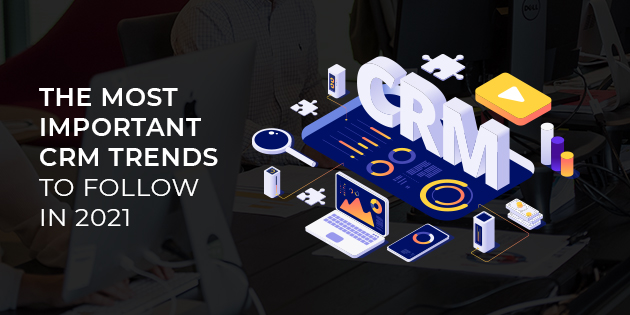CRM platforms evolve all the time according to changes in customer needs. This is why it’s vital to stay up-to-date with the most recent trends.
The range of technologies and channels available for meeting customer expectations has never been greater. Therefore, it’s now become critical to account for different touchpoints and interactions in the customer journey.
Due to that, the ever-growing CRM ecosystem keeps expanding functionalities to provide a better customer experience.
But it’s not only about the customers.
A CRM gives you an option to optimise your sales process within a centralised system. And you can do that by storing sales opportunities, new leads, and customer information in one place. Your marketing, sales, and customer support teams will also be able to access the information to boost sales, streamline the sales funnel, and offer better service.
But nowadays, the CRM platform is so much more than a database. As such, it pays to check out some of the trends that allow you to take full advantage of your CRM.

The Trends
Trend #1 – AI Is Becoming More Prominent
AI (Artificial Intelligence) encompasses a host of technologies, including natural language processing, predictive analytics, machine learning, etc.
CRM developers have been actively investing time and effort into leveraging these technologies for improved customer interactions. Also, AI allows for more accurate reporting and analysis of sales and customer behaviour.
For example, CRMs use chatbots to handle customer requests, wherein the bots are primarily responsible for collecting data for forwarding to human service representatives for further processing.
The best thing is that bots learn as they go, including from customer feedback about the interactions. Additionally, AI can score the quality of a lead, giving you the upper hand for closing sales.
To show you how all of that works, here’s an example.
Let’s say that you sell exclusive furniture and you get a lead from an interior design company. The AI would check your sales data, inspect the information about the interior design company, and compare the close ratios of similar businesses to assess the interest level.
The AI can then give you a score and perhaps recommend products for that particular customer.
Trend #2 – Social CRM Is on the Rise
Social CRM is the integration of different social media into the CRM itself. One of its main benefits is that you get all your social media channels in a single dashboard. This allows you to quickly gauge your audience’s sentiment about your brand or offer.
You also have an option to manage social media messaging and create a posting schedule across all channels. This might not be native to the CRM, however. You may have to find one that offers seamless integration with third-party software such as Buffer.
The key is that social CRM may significantly improve communication with your customers. Since everything is happening under one roof, you can respond to messages quickly and address customer complaints as soon as they happen.
This can help you build strong relationships with existing customers and establish trust with potential clients.
Trend #3 – Flexibility and Mobility Are More Important than Ever
Your CRM platform allows you to run your operations on your smartphone or tablet wherever you are. And since working from home has become commonplace, it’s essential to grant your team easy access to your company’s CRM.
Nowadays, it’s easy to find a CRM with a multi-platform app and cloud support. These features promote flexibility and mobility since all stakeholders access the same dashboard and data set.
Any changes would happen in real-time, streamlining communication and workflow within a company.
Trend #4 – Integration with IoT Is More Seamless
CRMs are traditionally associated with systems for claim processing, ERP, billing, and accounting. But they’ve since expanded to APIs (Application Programming Interfaces), ESBs (Enterprise Service Buses), and, finally, IoT (Internet of Things).
But how do CRMs help improve customer service in IoT?
Since they’re connected to the internet, IoT devices can send information about usage, product issues, and required maintenance. And CRM developers have already created platform connections to receive IoT feed and process it further.
For example, when a hospital refrigerator is low on coolant, it can inform the IoT platform. And when the info reaches the hospital’s CRM, it can record the incident and create a task for the maintenance staff to replenish the coolant, perhaps transferring the contents to a working refrigerator in the meantime. The CRM can also send an alert directly to the responsible staff members.
These can all happen automatically without any human input.
Trend #5 – Voice Technology Is Becoming More Dominant
Better accessibility is among the main reasons why voice technology is outpacing other software solutions.
Not that long ago, an Adobe survey even found out that 94% of users agreed that voice technology improved quality of life. It allows you to do more with less effort after all, particularly when it involves an AI assistant.
Take, for example, Salesforce’s Einstein voice assistant. It stood out as a top solution for salespeople to update their teams, send notifications, and track customer data. However, Salesforce decided to drop this project in favour of the Anywhere app.
Truth be told, voice technology is still relatively new to CRMs. But with higher hardware and software capacity to support voice interfaces, more CRMs will include the feature in the immediate future.
Trend #6 – Growing Number of Integrations
Currently, a CRM may pull information from up to 12 sources. But as business and customer demands grow and change, that might not be enough.
To keep up, CRM developers must enable advanced integrations that combine various data sources with third-party software for more accurate insights and analysis. Luckily, this process is already underway.
It won’t be hard for you to find a CRM that integrates analytical tools and marketing automation. These are aimed at tracking external customer interactions, but the integrations may also inform certain business decisions.
The same software often incorporates accounting tools to promote invoicing automation and customer segmentation. But this isn’t the end of it.
As said, future CRMs will become a one-stop shop for all internal and external business interactions. And with the advent of voice and IoT integrations, your CRM will become a hub for all your operations.
Trend #7 – Rise of CRM-Powered Self-Service
Primarily driven by bots, self-service allows for an unprecedented level of automation.
As mentioned, bots are very good at collecting information, but CRM developers found a way to kick it up a notch. There are now bots that can engage in meaningful conversations with customers and ask questions to improve customer satisfaction. Bots can summarise the data and offer more personalised content to customers based on the feedback received.
Connected to a CRM, bots are now capable of completing most contact management tasks without human input. The bots can lead potential customers through the entire sales and marketing funnel. For each touchpoint, the bots collect data for analysis and ask questions to improve the efficiency of the next step in the funnel.
From a business perspective, the benefits are immense. Greater efficiency and speed are in the offing, maybe also higher revenue and savings.
Trend #8 – Blockchain and CRM Will Integrate
As a secure decentralised ledger, blockchain refers to a growing list of interwoven records that facilitate transactions. Owners of those records use network keys to prevent unauthorised access. It’s near-impossible for someone to steal the data unless they get their hands on the keys.
By contrast, CRM platforms rely heavily on cloud technologies that might not be that secure. But if blockchain and CRM were to merge, know that it’d be much harder to hack into a cloud-based CRM.
That’s because blockchain synchronises data through a distributed and decentralised peer-to-peer network. It also encrypts user data and completes user authentication without exposing any vital information.
One considerable challenge is that blockchain transactions and data verification are still relatively slow. But there’s been a push to streamline protocols to facilitate faster transactions.
Trend #9 – CRMs Are Becoming Cheaper and Easier to Use
Based on the LinkedIn State of Sales Report 2020, 65% of salespeople have already adopted CRMs. But what about the other 35%?
Common barriers that hinder them are technical knowledge and resources to incorporate a CRM into their business. Additionally, some companies may not be able to afford a good CRM platform or doubt its ability to boost productivity and efficiency.
However, CRM systems are getting more affordable and customisable. For instance, a startup can select only the minimal functionalities and integrations and pay accordingly. They can add more as the business grows.
Additionally, CRM developers offer implementation support and system maintenance. Therefore, CRM implementation has become smoother and may not require extensive training to get your staff up to speed.

In CRMs We Trust
Without a doubt, CRMs have the capacity to support seamless communication, better productivity, and improved customer satisfaction.
As bots become more intelligent and involved in business processes, it’ll be possible to scale down your teams. Even better, the synergy between humans and bots will allow for much higher conversions and lower human effort.
The most promising CRM trends relate to IoT and blockchain integration. However, the infrastructure needed to facilitate this is still far from the mainstream. But it’s safe to assume that this is going to change in the near future.
So, if you’re looking to get the most out of your CRM, this article should point you in the right direction.
And if you need help with chat bots and automation systems, you can just get in touch with Automation Agency.


